SPECIAL SECTION
100 Days of COVID
IN AN INTERVIEW MAY 14, 2020, JUDGE BILL GRAVELL SHARED HIS REFLECTIONS AND HISTORIC EXPERIENCES AS WILLIAMSON COUNTY JUDGE DURING THE COVID19 PANDEMIC. HE PROVIDED, EXCLUSIVELY FOR GEORGETOWN VIEW READERS, A MACRO VIEW OF THE FIRST 100 DAYS OF THE CRISIS — ITS CHALLENGES AND TRIUMPHS, AS WELL AS THE EMOTIONAL IMPACT IT HAS MADE ON THIS FORMER PASTOR’S LIFE.
On Day 105, Judge Bill Gravell looked at the handwritten list of names he keeps with him—the people in Williamson County who have died from COVID. “Twenty years from now, in spite of a few negative comments, what I will remember is the ‘I CAN’ attitude of our people. I’m going to look at this list of names, and ask myself again if I did enough, or could I have done more?”
DAY 1: On January 30, 2020, Williamson County Judge Bill Gravell was listening to a conference call about a disease in a foreign country, wondering, “Why am I on this call?”
One hundred days later, on May 9, he was at a free-standing, drive-through, public COVID testing facility in Taylor, when he received a text that two county residents had passed away, bringing the number of CVD-19 victims to 19. “My thought at that moment was the next day was Mothers’ Day and one of those people was a mother and a grandmother. How horrible the day would be for her family.”
He says it also struck him that she was 107 years old, and had lived through the Spanish flu pandemic of 1918, the Great Depression, both World Wars, the Korean and Vietnam wars, Communism, and the moon landing. “Losing her memories is a loss to us all.”
Despite any person’s individual history, Judge Gravell says he feels an obligation to everyone who has lost a life to this sickness, and has committed to reach out personally to their families, as well as make a public statement about each. “When this started, I didn’t have any idea what that might mean, or how many there would be. I know—as I sit here today—we have not seen them all.”
THE SCARY ROOM
If you look at the collection of crisis management manuals in Williamson and other counties, you will find binders entitled TORNADO, FLOOD, and ACTIVE SHOOTER. In none of those libraries, until now, was there any guidance for PANDEMIC. Yet leaders across the county, state, and nation come under fire for nearly every decision they make, and the average citizen struggles to know who, or what, to believe. Still, more than 100 days in, there continue to be things left unsaid, which leads to some of those criticisms, but perhaps for good reason.
Judge Gravell and his pandemic team number just under 100 people. While it was often necessary to have many of them in the same room for response and preparation, there was also another room…in the back. In that room, only 12 team leaders were invited to discuss the most delicate of emergencies. “It started out as an executive meeting room,” Judge says, “but was soon renamed ‘The Scary Room.’ I heard things in that room you don’t want your children to hear. Things discussed in that room would take your breath away. Because of those things, we prepared for the absolute worst that could have happened, and it was a burden that became so very heavy.”
May 9 ended our first 100 days. I’ve waited a long time to tell this story.
Judge Bill Gravell
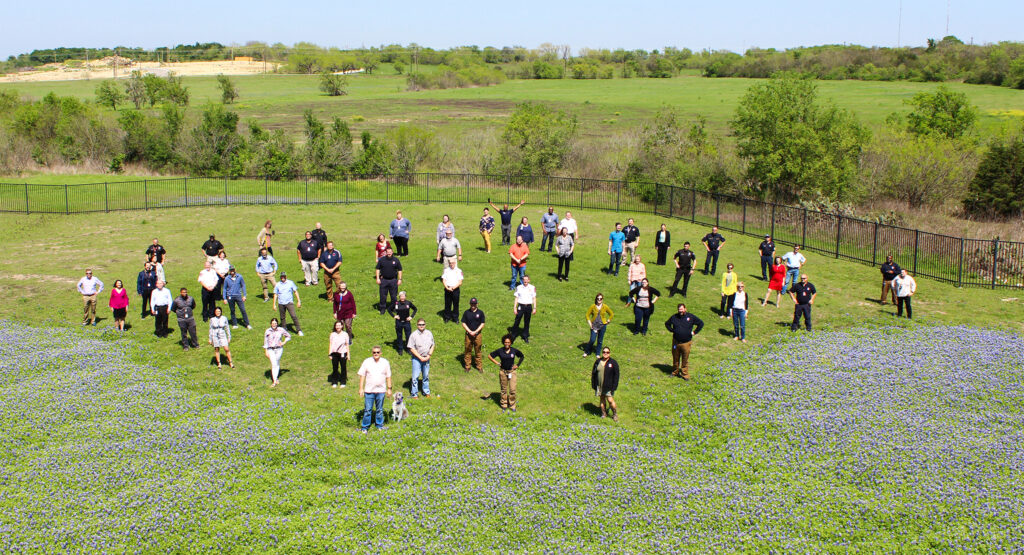
In the Scary Room, Judge Gravell and the Emergency Services Operations Center (ESOC) team worked collaboratively to address many concerns. Elsewhere, he credits Mayors and City Managers for their contributions and support for maintaining an excellent working environment, but the responsibility for final decisions fell to the Judge. “I have two jobs; 99 percent of it is presiding over Commissioners Court, which is the routine business of the County. The other 1 percent is head of emergency management and that is astonishing. Just one conversation in the Scary Room produced a plan to put boots on the ground. Constables, deputies, even school resource officers began walking Walmart and Home Depot, to give us a sense of, and ensure calm in potential hotspots. This was critical because the Commissioners and I were concerned, early on, about the Stay Home order; but we have a lot of very smart people working for our County; including more than a dozen Ph. D.s, studying the various issues.”
PRIORITIES
“On Day 1 in Williamson County, the virus had only been around for six weeks and we didn’t know what we didn’t know. One thing I learned; I work with the most amazing group of people I’ve ever known.”
DAY 33: In his first social media release, the Judge announced he and the Commissioners had determined the County would prioritize protection—based on risk—of senior adults in nursing homes, Sun City, corrections facilities and inmates, and children.
Immediately after, Scary Room conversation turned to the lack of hand sanitizer and the risks posed to police officers and paramedics. “We were running out of gloves and masks,” Judge says. “I didn’t understand how we could have run out of those things and I was angry. But the supplies just didn’t exist, so I said, ‘If we can’t buy it, let’s make it.’” One hour and three phone calls later, local breweries and auto shops were manufacturing hand sanitizer, and the plan for the Mask Brigade was born.
Beyond basic PPE supplies, there were no test kits to be found. Judge Gravell called companies across America and around the world; even a CIA operative he thought might have some to sell. “Nothing was FDA-approved and I couldn’t abide knowing our police offers or EMS responders might be exposed. It was the only task I worked on personally, and when we finally found some, I broke down in tears.”
BURDENS OF LEADERSHIP
DAY 43: The first four cases of COVID were confirmed in the County and Judge Gravell announced many closings. “We have to do this to protect our community,” was the Judge’s statement—and moral imperative—as he found himself asking schools and businesses to close. As he continued to receive information in the Scary Room about the death tolls in Italy and China, he knew the orders to shelter in place would come, just as the posts and emails became more heated, and even threatening.
Day 49: “I took all the steps necessary to protect our community and find a place for senior department heads to continue to work, in safety, for our safety. I lived behind the building, with an armed deputy outside my RV, due to security concerns, after issuing the orders. I was followed, photographed, threatened, blamed personally for a suicide; and one said if I killed his business, he would kill me. All this, then I went back to the Scary Room for more.
“You make decisions with the best information you have. I knew my decision to shut down could destroy companies; people would lose their jobs. I struggled mentally and emotionally to weigh this cost with preserving lives.”
As the Judge continued to prepare for the worst−securing his senior team and adapting a temporary morgue−he also prepared to build a hospital in anticipation of a patient load that could number in the hundreds.
“We had an entire building given to us. Dell provided a three-story building with 325,000 square feet. At their own expense, and because they had already sent their employees home to work, Dell staff spent 14 days disassembling 800 office cubicles to prepare for the need that, fortunately, never came.”
Dell also asked what else the County might need, and when Judge Gravell asked for 100 laptops for his staff to work remotely, they re-opened a plant in Tennessee and the laptops arrived within a few days. “All of our trace teams needed computers, to help us protect nursing homes, Sun City, kids, and inmates. Thanks to Michael Dell and his team, we were able to give them every ounce of support they needed.”
When he was criticized for his choice to contract for temporary morgues and refrigerated vehicles, Judge rested on information provided in the Scary Room, and while allowing that the UT study* was flawed, no one knew it at that time. As the number of victims continued to climb in May, the trucks remained.
“When news came from England and Spain, it was an awakening. When I saw photos of bodies lying outside in New York City, I made an absolute commitment…
This. Will. Not. Be. Us.”
“THE MARTIAN” APPROACH
With myriad needs, and levels of immediacy mounting, Judge Gravell began delegating to experts of all kinds.
Knowing his reputation for excellent customer service, Judge kept County Tax Assessor Larry Gaddes at work as an official “Getter” of everything from gloves to more computers. Larry was tasked to the Crisis Logistics team and brought several employees with him, in addition to converting his own office space to mix gallons of alcohol and aloe into hand sanitizer.
As Larry got busy finding things, Judge Gravell’s guidance was simply, “Don’t tell me what you can’t do.” Larry and his team proceeded in every legal way necessary; passenger vans to double as EMS vehicles; pickup trucks, and even a black Tahoe with lights and sirens were put in service to a temporary warehouse for food and supplies, which he also found. Judge Gravell says, “I continue to be amazed at how this team could make something out of nothing, over and over again. They effectively took piles of junk, threw them on a table, and found a way to fix problems.”
Judge Gravell applauded personal tenacity as well. For one of Larry’s tasks, he drove a van all day looking for gloves and disinfectant. “He went to every business he found open and, at the end of the day, was disappointed to deliver just a half-pallet of items. I couldn’t have been more thrilled.”
THEY may not be going to the Moon or Mars, but with respect to two of the best NASA movies ever made, you may soon see the logistics team’s new t-shirts…“We’re going to Apollo 13 the **** out of this”
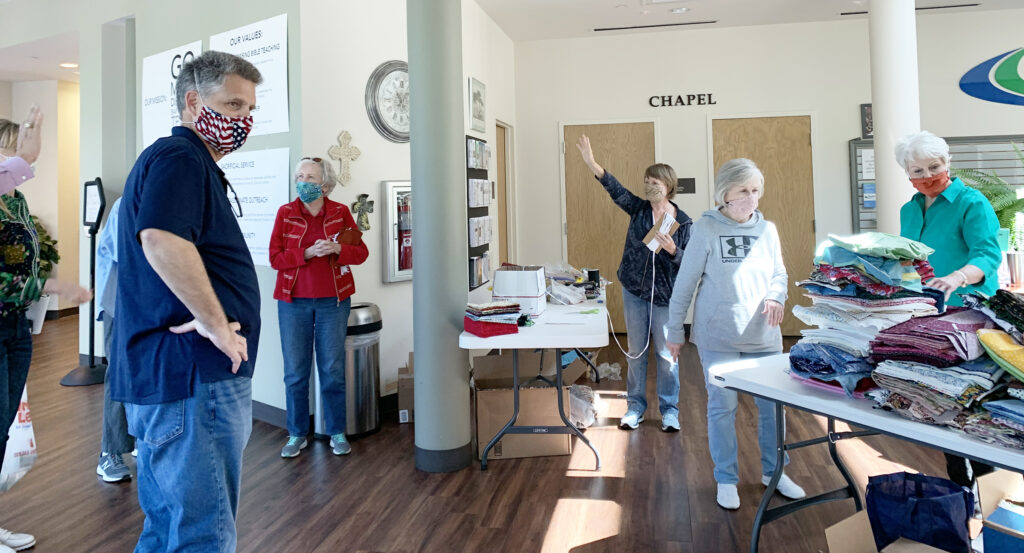
Celebrating Generosity
As tensions grew, the leadership team recognized the need to share information and tell stories in a way the community could follow. The Public Relations office, under the oversight of Connie Odom, ramped up to seven employees to produce PSAs, social media videos, and untold press releases. Judge recalls, “Many people gave a lot…”
DAY 52: As luck would have it, Celebration Church’s Pastor Joe Champion invited Judge Gravell to speak to his congregation, and as Joe was walking into his studio to film a video, he asked how the church could help. Shortly thereafter, and at no cost to the County, Judge Gravell had that professional studio, and staff, at his disposal for several weeks. “Armed with scripts from Connie, I went in every day to tell our story. I knew if we could bring people along with us, we would not also fall victim to anarchy, violence, or fear.”
Then, Celebration just kept on giving. Its buildings filled with pallets full of food, and dozens of volunteers to prepare boxes for the Austin food bank. Not long after, they provided even more space for the COVID Ranger mask volunteers. “That church is giving everything they can− a wonderful example of the body of Christ at work.”
When people talk about this 20 years from now, they will say we worked together, fought and prayed together, and cried together. We stood strong, and history will say we did it together.
Judge Bill Gravell
ISD Delivers
DAY 53: Judge Gravell says working with the schools was a wonderful experience. He met with the county’s many superintendents to talk about unprecedented changes as things began to get serious. “I looked into their eyes and one person asked, ‘Judge, are we going to be okay?’ I said, ‘Absolutely, but we have to do this to protect our community.’”
He met with the superintendents again before holding a press conference to announce school closings, and one person expressed great concern about serving meals to the kids who truly rely on school breakfasts and lunches for their nutrition. “My first concern was about all the cross contamination in food production, but these leaders all got together and came up with a plan for their individual communities. Many served thousands of meals, five days a week, and the Florence ISD served on weekends as well.”
The superintendents also gathered up their school nurses and dispatched them for assignment in the Health District to serve on trace teams. “When I also asked for officers, we deputized Liberty Hill and Hutto SROs. All of our schools were amazing and they helped solve problems. Everyone pitched in, from thermometers and masks to cleaning supplies, and we still have their nurses working with us today.”
Stop the Hoarding
DAY 55: Having seen the lines at grocery stores, and out of concern for the elderly, at-risk, and healthcare workers, Judge Gravell reached out to the public to be more considerate of neighbors and not stockpile necessities that were difficult to come by in the early days. “People had to stand in line for hours to provide things for their families. I wanted to encourage them to take a deep breath, because this was never a food emergency. Our supply chains were significant, especially our wonderful H-E-Bs and Randall’s, and we always knew they would have more in the days ahead; the trucks were delivering every day.” He mentioned specific directives related to limiting toilet paper, dairy, and other purchases, as well as applauding stores that changed hours to allow high-risk and first response customers to shop at special times. “I just asked people to be patient and work together. At the very least, I hoped we could learn from our kids and play well together. Our children will remember forever what we taught them in this difficult time, and it was important to keep that focus on the safety and well-being of our community first.”
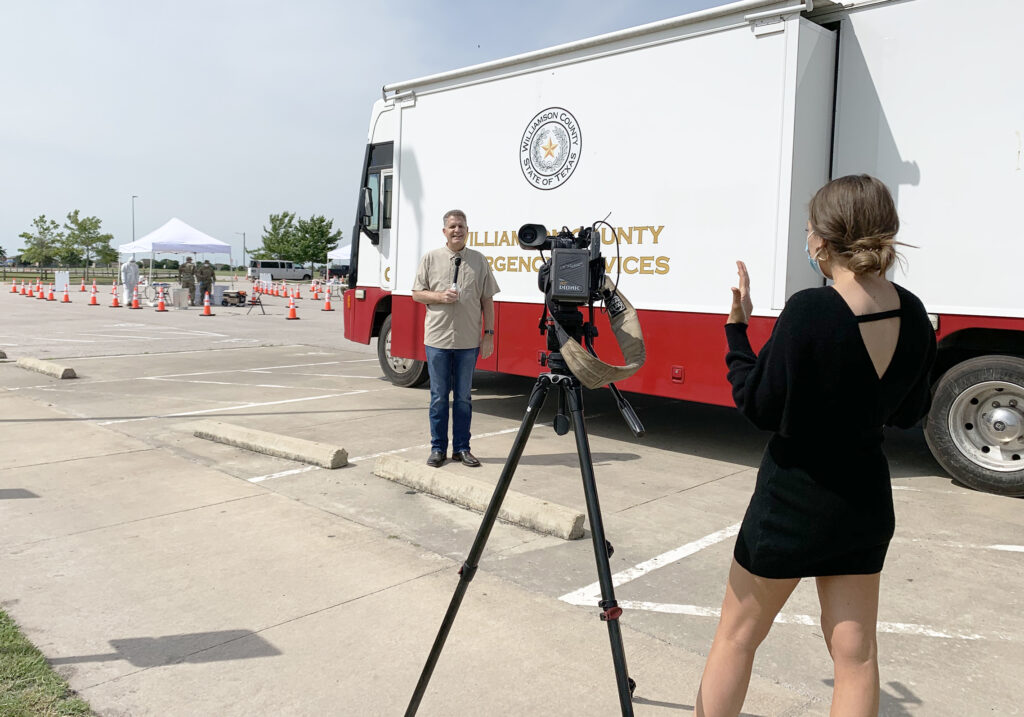
Ask and ye shall…
DAY 57: When the recommedation for face coverings came, Judge Gravell made what he felt was one of his best decisions. “Since we couldn’t buy them, we had to make them. Even today, we are still waiting for our order of 50,000 N95 masks. Our paramedics were taking their N95s to Austin to have them cleaned for re-use. I asked God who could take on the task of managing mask production, then asked State District Judge Donna King to stop being a judge for a while to be a leader of people. I couldn’t be more pleased with the production and the efforts of Judge King, Paula Dennis, and more than 200 volunteers in the Mask Brigade*.”
As if laptops from Dell weren’t enough, the County Elections bureau provided 60 additional computers for the Health District, followed by a call from the Vice President of Apple, who also asked if the County had any needs. Judge said he needed jumbo iPads and cleaning supplies. A few days later, a dolly full of iPads arrived at a briefing, and the VP himself showed up with thermometers for nurses, day care centers, and municipal buildings with essential employees.
Judge Gravell also credits those who work in our Criminal Justice system. “I knew it was coming; that we were going to have to shut down the courts. I spoke to the District and County Attorneys and the Judges, and told them, ‘I don’t know how you’re supposed to fix it, but go and come up with a solution.’ Those elected officials and employees pulled more resources together in one week than I could have imagined. Adaptive court is still not ideal for our needs, but I continue to be impressed with our ability to work together.”
Something’s Not Right
DAY 62: There was a Scary Room meeting every morning at 8:30 with the Sheriff and the Health District to discuss the night before, and give direction for the day. At 9am, Judge Gravell spoke to the leadership team to work on messaging. “On that particular day, we had clarity on many things, but I felt like we needed to go back and double check some things. Only one confirmed case in our nursing home population seemed too good to be true and I asked if we had really checked.”
On that day, the decision to lock down the senior facilities, however high the cost, proved to be the wisest. Amy’s Army, the County’s Rapid Response Viral Strike Team, found one employee who tested positive. There was a collective gut feeling that there was more going on, and by 1:00 the next morning, with help from deputies who delivered test kits across the county, the Health District had tested everyone; nursing home employees, paramedics, and others in the first response group. “Without [team leader] Amy Jarosek going into that first home, and getting the ball rolling, we could not have prevented a truly bad situation. Still, there are a lot more positives coming.”
Without help from an overwhelmed state EMS, the county Health District created a system, set up public testing sites, and continue to work with private centers like Family Emergency Room for free testing. He adds, “We pay for the kits and they provide the work at no cost to the county. We are now able to do hundreds per day.”
Another First
DAY 74: “I never thought there’d be a day I would shut down churches,” Judge says. “The thought that people just couldn’t go—talk about infringing on someone’s right to assemble. I had conference calls with many pastors and church leaders, and some expressed clear frustration in that decision. But I was at the point of protecting their lives first.”
On Easter Sunday, Judge Gravell left the ESOC, after what, he says, felt like 40 days. “It was easier to keep security at the command center than outside my house, but Easter was important, and I just wanted to go home. We watched services on the computer, and had a communion of wine and garlic toast. I never thought this would be a thing, but I was so grateful for it.”
The Business of Business
DAY 76: Although he didn’t tell anyone, Judge Gravell filed for CARES funding from the Federal Government. Speaking with business leaders Gordon Logan, Josh Schroeder, Will Peckham, and others, about business and owners who were losing so much financially, they came up with a plan to help small businesses get back on their feet. “I was afraid we wouldn’t get anything and I prayed, ‘Lord, do not let us down. We need help and we need it badly.’”
Still keeping it to himself, Judge Gravell called County Treasurer Scott Heselmeyer every day to ask if there were any new deposits. “He asked me what was up, and finally—I can imagine the look on his face—he texted back that there was a deposit for $93,382,340.10. That was the start of the CARES Act and it’s still not enough. I’m going to keep asking for more.”
Scott and his committee created the Wilco Forward program to distribute up to $25 million to small businesses and sole proprietors. Applications poured in, staff worked through the weekends to fill those needs and by day 24 of the program, they had distributed nearly $19 million.
“My biggest role in all of this was to be an encourager and cheerleader. I remember telling people, ‘You can do this,’ then walking away just hoping they bought it, because I myself didn’t know how they might do it. When I saw them again, I just assured them I knew they knew how to do it.”
DAY 100: “We still have a crisis on our hands,” Judge says. “There are 22 paramedics in quarantine, for myriad reasons, and unable to do their job. Still, our EMS department is operating to capacity, and we continue to find clusters in businesses, nursing homes, and EMS systems. But it doesn’t matter if this is day 1 or 100, all the scary stuff that has happened has not led me, for even one day, to fail to think, ‘We’ve got this!’
“Even on those days when I wonder where we will get all the things we need, I just tell my getters and scroungers… and it appears. I have more confidence in our cities, counties, and state government than I ever have. ”
On day 104, when the Thunderbirds flew over Williamson County, Judge Gravell took a moment away from making scary decisions. He says, “No matter what you do, someone will be angry, hurt, or may die. I just want to make good decisions and, perhaps selfishly, have a place left for my grandchildren. This has been a nightmare, and, somewhere, I lost my sense of humor.
“But, the Thunderbirds reminded me to just celebrate America. A symbol that we will stand again. We may have been brought to our knees because of this, but—however wobbly—we are standing today.”
About that same time, Judge announced the construction of a new children’s hospital. “Having a world-class facility choose Williamson County is a reminder of the blessings we have living here. It’s one of those moments that lets us forget, because, for us, success is completely normal.”
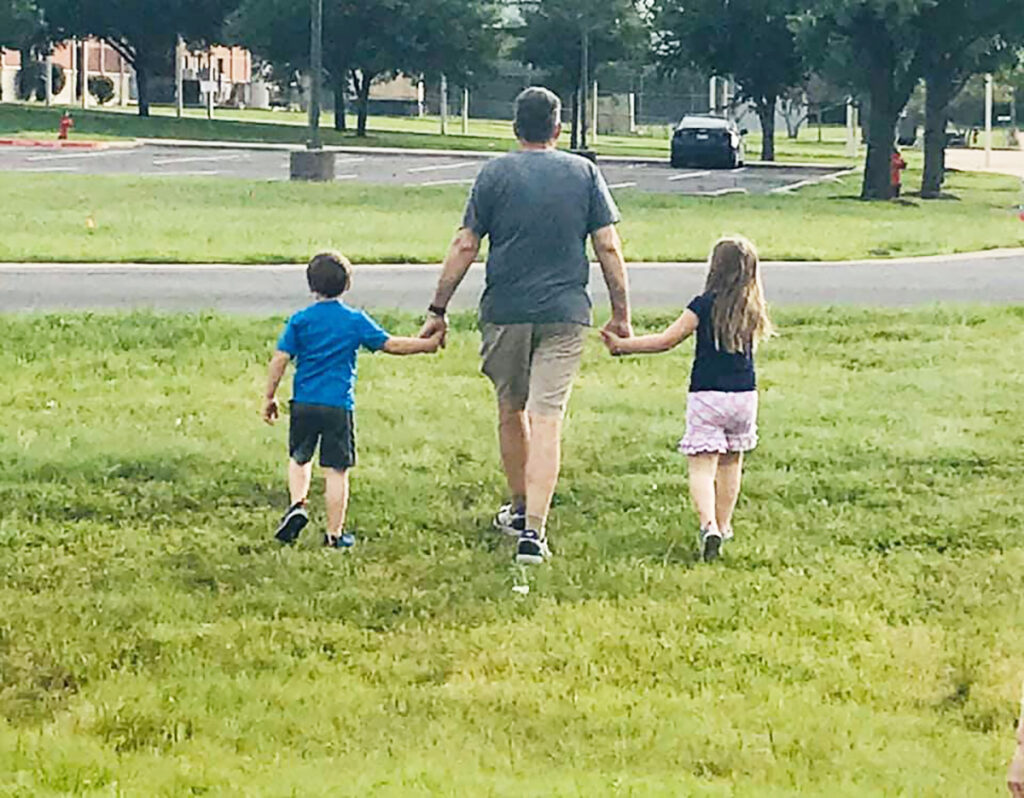
I gave everything I had, and some that I didn’t have, to protect this community. Some days I was so full of crap; being optimistic, and telling people they could do it; watching them walk out of the room shaking their heads like I was an idiot. But, we didn’t have a choice; we had to survive.
It’s still not over. There will still be people who will get sick and lose their life. But it is time for us to stand up and walk.
621 people (at press time) in Williamson County have contracted the Coronavirus; 25 have lost their lives.
GEORGETOWN RESPONDS
CITY MANAGER, DAVID MORGAN

“Emergency planning is typically centered around short-term things like floods or tornadoes,” David says. “As a public safety emergency, this was very unique and required a unique set of responses.”
Georgetown’s primary responsibility was to follow orders created at the Federal and State level; “We saw our orders shift quite a bit, and we worked hard to evaluate those changes for Georgetown, but also in coordination with other cities, for consistency’s sake, because so many people live and work in different parts of the county. We made sure we were complying and enforcing directives as an organization, and also within the community. We were challenged over a few weeks’ time to really shift our own resources to enable us to provide services, and adapt our practices and policies around telecommuting.”
City staff were able to improvise quickly to the inability to meet physically; i.e., hold Council meetings, issue permits, then manage the changes necessary to shut down the school district after Spring Break. “We also had to consider the method and the impact of shutting everything down in the city, including how to provide day care for all the essential employees who continued to work.”
One rapid modification took place at the city’s Recreation Center. The building was quickly converted and adapted to CDC guidelines to become a day care facility. City staff also supported and advocated for data gathering to help track the spread of the virus and its impact. “You can never have enough data when it comes to tracking and decision-making. In a crisis, you are really challenged to make a lot of short-term plans because circumstances change so quickly. Early on, we determined our priorities and focused on those as a decision-making tool.”
The City worked diligently to provide as many services as possible while ensuring it was being done with everyone’s safety in mind. “Even our public library went from being closed, to providing curbside service, then delivery, then back to curbside, and now grab-n-go. We are doing everything we can to keep our services active while still following orders from the county and state.”
David is pleased they have been able to focus and increase communications via COVID webpages and Facebook live events. “Having an increased presence online has allowed us to share data quickly, and we continue to ramp up communication to increase and maintain engagement to provide the latest information available.”
POLICE CHIEF, WAYNE NERO
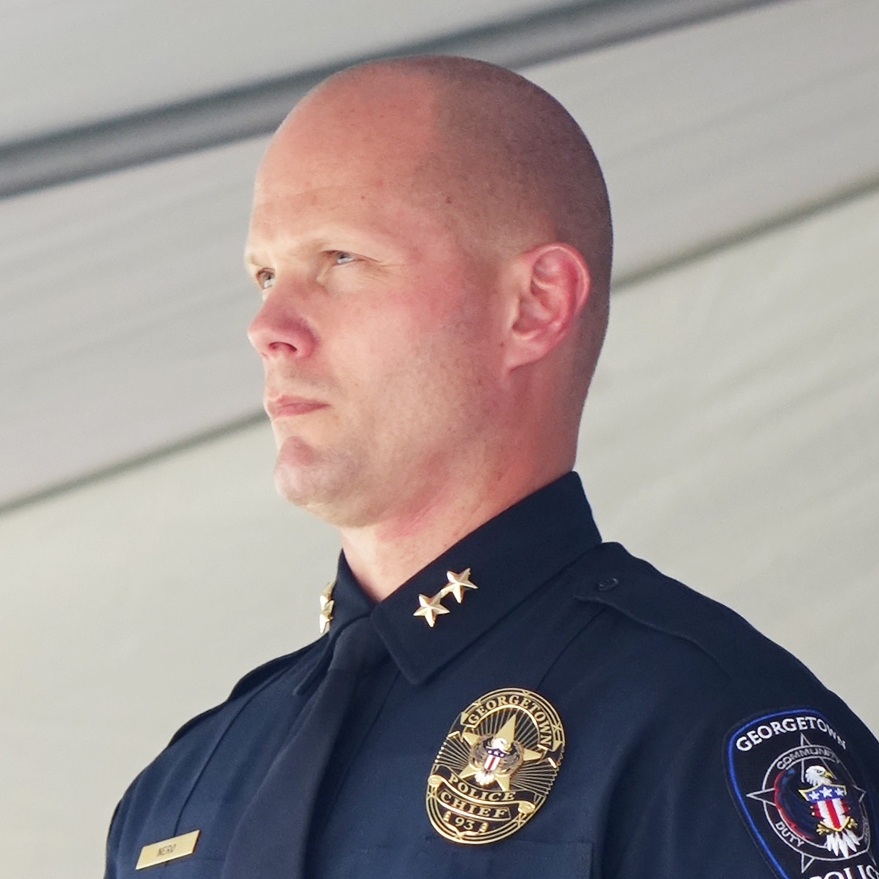
“Simply put, this situation is surreal, but we have a mission,” Chief Nero says. “There are many unknowns and we do everything we can to stay ahead of the curve. We cannot stop doing what we do even though it involves people and contact. We maintain expectations for our officers, ensure they are crystal clear on changes, and keep them safe while they are meeting that mission.”
The Georgetown Police Department set three priorities at the beginning of the crisis—maintain service, protect their people, and make sure each person has clear guidance and works with good information.
Chief Nero says his department was more than capable, and maintained the kind of service we’ve come to expect, while protecting officers and employees. They limited self-initiated activity—took many calls by phone—closed the lobby to the public, and minimized arrests unless absolutely necessary.
“We kept in close contact with other area chiefs to ensure no one area was doing their own thing, which might cause confusion for residents who needed to move around. Many people are in unsure territory and we wanted to be sure our communities received consistent messaging that aligned with state and county guidelines. ”
The Chief explained consistency is a priority in law enforcement to assure the public of fairness. “It would be easy for an unsure public to believe we are being heavy-handed, but we are doing all we can to minimize the need to take criminals to jail. There is some ownership of that on the citizens to be responsible, do as they are asked, without making us take care of things; e.g., we did not want to arrest anyone for staying too close together. Our job is to protect and serve, so there is a time and place for everything we do.”
HOW DID GEORGETOWN DO?
Reports generated by Assistant Chief Cory Tchida indicate the “emergency” period was largely uneventful. Tracked data show a trend decline in arrests and automobile accidents. “Crashes went down during the Stay Home orders, but as soon as things opened back up, it quickly went back to normal,” Chief Nero added. There were relatively few violations of emergency orders, and—barring a daily spike or two—no significant change in domestic violence. “Disturbances were at a minimum and we appreciate the calm from everyone, but I believe people are ready to get back to normal, which for us can be hard.”
The Chief did note a trend that seemed to be unique to people staying home or close by; “We found a group taking advantage of the opportunities to burglarize vehicles. There are five to ten individuals from south Austin, who normally just walk down the street checking car doors and take things, or find keys and steal the cars. This is happening all over the County, so, as always, just lock your things and don’t make it easy for them.”
The difference between this event and most other emergencies is as psychological as it is profound. “If we had a hurricane, there is no question Governors or Judges have the right to make declarations, and we implement procedures to manage movements and credentials as necessary. People understand that inconvenience, but they are tolerant because of destruction they can see. There is no national outrage when there are houses flooded or destroyed. This time, the entire United States was a disaster area, but the vast majority of us did not experience what happened in New York City. Most people felt quite a disconnect between what they were being asked to do and what they were seeing and feeling. It just didn’t compute. But, as it always is, our job is to understand that frustration and respond to it consistently. We continue to educate and inform, collaborate with other cities and chiefs, and make sure people understand the best they can.”
MAYOR DALE ROSS
As of June 1, we await guidance from Governor Abbott to finalize our activities for Independence Day.
We, unfortunately, will not be able to hold our parade or festival in San Gabriel Park, but it is our resolute intent to have fireworks on the evening of July 4th.
I am working with the City Manager and staff to create a plan for drive-in participation. We are encouraging residents to take advantage of the many parking spaces within and surrounding the park, including, perhaps, the areas at the old rodeo arena nearby — if it hasn’t rained! — to watch the show from their vehicles.
Families are also welcome to bring lawn chairs and enjoy the fireworks inside or near the park, while practicing safe social distancing between non-household groups.
San Gabriel has 180 acres of parkland to provide plenty of space for ‘distancing’, and three points of entry and egress to get everyone in and out safely.
As well, there are many places — from IH-35 feeders and other parking lots around Georgetown from which the fireworks can be seen. We may even see an increase in participants as the City of Round Rock has decided not to hold an event that evening.
The bottom line is we want to celebrate freedom as a community and this wonderful display is a free event; it doesn’t cost anything for the good people of Georgetown to enjoy a great night out, to take our minds off the worries of this strange time.
Look for more information this month from the City (Georgetown.org) as our plans continue to develop.
